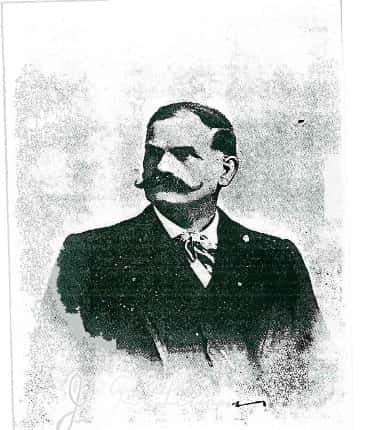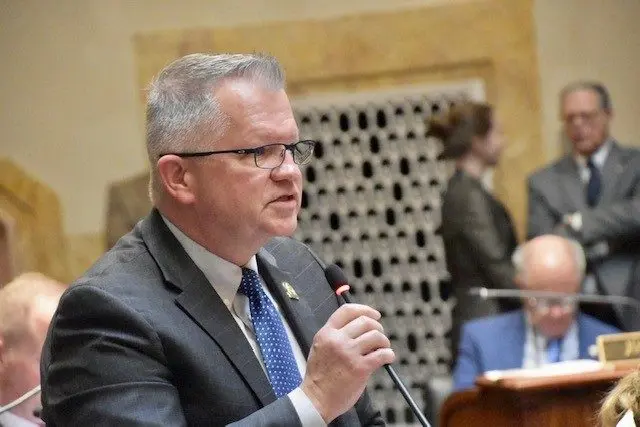James R. Lemon
Written by Justin D. Lamb

Photo courtesy of Marshall County Archives
James R. Lemon was born on April 10, 1848 in Guilford County, North Carolina to Joseph G. Lemon and Demarias A. Lemon. Looking for better opportunities, the Lemon family decided to move west, making a seven week trip and traveling over eight hundred miles in a two horse wagon. The family finally landed in the Birmingham community of Marshall County around Christmas 1855. During this time, Marshall County was a wilderness and was sparsely populated. The Lemon family had no money, so they drifted from town to town in the county. Around the beginning of the Civil War, they settled permanently in the Briensburg community. As a child, James R. Lemon received very little education, but his father made sure he attended school. Lemon became an avid reader and invested most of his spare time reading as much as he could. By the time he was twenty-two, he was revered as one of the best scholars in his community.
In 1870, Lemon went to Henry County, Tennessee to teach in the local schools. After only three months, Lemon returned home and joined the Marshall County Seminary School in Benton. In the Fall semester, Lemon returned to Birmingham where he divided his time into teaching school and working in a general store. Soon Lemon met Cora A. Wilson and the couple married on March 13, 1873. The couple would eventually have three children: Clay, Luna, and Maud.
By the mid 1870s, Lemon and his father-in-law, Dr. J.K. Wilson embarked in the drug business in Briensburg which continued until Dr. Wilson’s death in 1885. Lemon kept the drug store and went into partners with Judge W.A. Holland. In 1884, he expanded his interests in the drug store business and went into partners with L.K. Starks in Benton and Hardin. Tragedy struck the Lemon household on March 20, 1885, when Lemon’s wife, Cora, suddenly passed away. The death of his wife left Lemon to care for three small children, so in October 1885, Lemon married Lucretia Thompson. The couple would have two children: Scott and Bryan. In 1884, Lemon left his most lasting impression on Marshall County’s history when he and a few others gathered at the old Benton Seminary to revive the Southern Harmony singing tradition. Big Singing Day, as the event is called, is still held every year in Marshall County on the fourth Sunday in May.
On May 1, 1890, Lemon became involved in the newspaper business when he purchased the Benton Tribune. Under Lemon’s leadership, the Benton Tribune became the leading newspaper in the county and is still in business today. In 1894, Lemon once again expanded his business interests when he formed the Lemon-Gregory Hat Company in Paducah, Kentucky. The wholesale hat company was one of the largest in the area and Lemon served as President and General Manager. The following year, Lemon purchased another paper, the Paducah Register, and in 1894, Lemon published a complete history of Marshall County entitled Lemon’s Handbook of Marshall County, Kentucky. Lemon built a home on Main Street in Benton which despite being altered from its original state, is still standing today. The house is on the National Historic Registry and has been recognized by the Kentucky Historical Highway Marker Program.
Throughout the years, Lemon became involved in politics and was appointed a member of the State Board of Equalization by Governor J. Proctor Knott. By 1892, Lemon was named Master Commissioner for Marshall County and became Postmaster at Briensburg under the Grant, Arthur, and Cleveland administrations. Lemon was active in the Democratic Party and served on the Marshall County Democratic Committee for several years.
In 1899, politics in Kentucky was very tense and heated. State Senator William Goebel, who as Senate President Pro Tem had introduced and passed the controversial Goebel Election Law which was the sole deciding factor in any disputed election, became the Democratic nominee for Governor. Goebel advocated governmental relief for the poor and reigning in the “robber baron” tactics of big business. Republicans and a few conservative Democrats believed that Goebel was too radical and his policies were dangerous for the state. However, Goebel received tremendous support from many of the poor and underprivileged all across Kentucky. Most newspapers in western Kentucky including the Paducah Daily Sun and the Hopkinsville Kentuckian, who normally supported Democratic nominees, refused to support Goebel for governor and they endorsed the Republican nominee, William S. Taylor. When Lemon’s partner in the Paducah Register did not want to endorse Goebel for Governor either, Lemon sold his interest in the paper and formed the Kentucky Leader, which along with the Benton Tribune, were the only two newspapers in Western Kentucky to support Goebel for Governor.
That November, the race for Governor was extremely close and the outcome was contested. Both Goebel and Taylor claimed they were Governor and tensions were high all across the state. With the state nearly on the brink of civil war, Goebel was finally named the winner in a controversial manner through the Goebel Election Law in February 1900. However, his term was cut short when a bullet struck him down on his way to Capitol Building. Goebel died a few days later and he is the only Governor in the United States to be assassinated. Republican Secretary of State Caleb Powers was accused of being the mastermind behind the plot to kill Goebel. Powers was eventually convicted, but later pardoned by Republican Governor Augustus E. Willson.
After the controversial election, Lemon disposed of the Kentucky Leader and focused on running the Benton Tribune. Lemon eventually moved to Mayfield and established the Mayfield Messenger, which he operated until his death on January 27, 1919. James R. Lemon was laid to rest in the Strow Cemetery in Benton.






